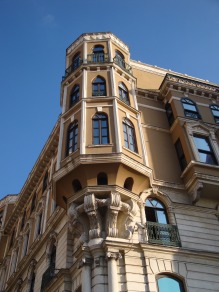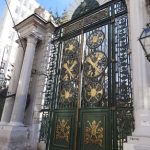“Top of the Hill
İstiklal Caddesi looking uncomfortably crowded? Then duck down a side street into Meşrutiyet Caddesi (Constititional Monarchy Street) that runs parallel with it on the Golden Horn side all the way from beside the British Consulate near Galatasaray Lisesi (High School) all the way past the iconic Pera Palace Hotel to Tünel where the funicular railway awaits to carry passengers quickly down to Karaköy. When İstiklal Caddesi was the Grand Rue de Pera, Meşrutiyet Caddesi was the Le Petit Champs, a reflection of the importance, at that time, of the French language in this part of town.
What it now called Tepebaşı was, in the 19th century, known as Pera which was the part of town where the most of the ambassadors and foreign merchants lived until the founding of the Turkish Republic. Like most of old İstanbul, it was originally furnished with wooden houses but a sequence of fires – most disastrously in 1870 – led to a decision that all new buildings should be of stone. It was this more than anything else that threw open the doors for modish European architectural styles to take a hold here.
Since the US Consulate moved from Meşrutiyet Caddesi to İstinye, taking with it all the heavy-duty security, a growing number of boutique hotels have opened here to join the many smart restaurants and cafes. Most of them are housed in grand 19th-century and early 20th-century mansion blocks, one of the few blots on the landscape being the ugly glass-and-steel TRT building housing the state radio and television stations which continues to stand its ground despite efforts to evict it in favour of a Frank Gehry-designed extension to the Pera Museum.
 British crime writer Barbara Nadel with British crime writer Agatha Christie’s typewriter in R411 of Pera Palace HotelAlong Meşrutiyet Caddesi
British crime writer Barbara Nadel with British crime writer Agatha Christie’s typewriter in R411 of Pera Palace HotelAlong Meşrutiyet Caddesi
Near Galatasaray Lisesi, the British Consulate building was designed by William James Smith and Charles Barry in 1844 and stands in a fine and very English garden where a fete is held every June. Restored after the bomb blast that destroyed the gatehouse and killed the consul in 2003, St Helena’s Chapel is sometimes open for church services and for concerts.
Just past the Consulate on the opposite side of the road the Passage Hazzopulo leads into a pretty cobbled courtyard containing one of the last traditional teahouses off İstiklal Caddesi. For a while others joined it until they were evicted in 2022. The future of the courtyard looks uncertain. Here, too, is Katia Kiracı’s hat-shop, the last Greek-owned business in an area where there were once hundreds of them. Into the 1950s the Passage was home to all sorts of businesses associated with fashion. Not any more, sadly.
Continuing along the street you will pass on the left the İstanbul Araştırma Enstitüsü (Istanbul Research Institute), which hosts small, free exhibitions on aspects of Istanbul’s history. It was designed in 1892 by the Italian architect Guglielmo Semprini who was also responsible for the nearby Grand Hotel de Londres (Büyük Londra Oteli). Although the nearby Pera Palace has the more illustrious rollcall of past guests, the novelist Ernest Hemingway chose to stay at the Büyük Londra, today a dinosaur hotel with an atmospheric lounge that must surely fall prey to developers any time soon.
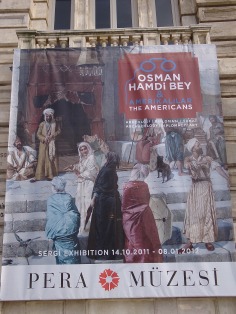 The Pera Museum (Pera Müzesi, closed Mondays, admission TL100, free Friday 6-10pm)), a few doors further down the road past a passage running under the ugly Odakule (1975) to İstiklal Caddesi, is housed in a grand building that was originally the Hotel Bristol. It is owned by the Suna and İnan Kıraç Foundation and hosts changing art exhibitions as well as a permanent collection of weights and measures, and images of İstanbul from the 17th century, most of them created by foreign visitors to the city.
The Pera Museum (Pera Müzesi, closed Mondays, admission TL100, free Friday 6-10pm)), a few doors further down the road past a passage running under the ugly Odakule (1975) to İstiklal Caddesi, is housed in a grand building that was originally the Hotel Bristol. It is owned by the Suna and İnan Kıraç Foundation and hosts changing art exhibitions as well as a permanent collection of weights and measures, and images of İstanbul from the 17th century, most of them created by foreign visitors to the city.
The single best-known painting is Osman Hamdi Bey‘s magnificent The Tortoise Trainer, which is far bigger and more impressive than the tawdry reproductions around town might suggest.
A little further down the road is the Italian Cultural Centre at which point the road veers sharply to the right in front of the brashly modern, high-rise Marmara Pera hotel. It’s round this bend that you’ll find the Pera Palace, the hotel in which Agatha Christie penned parts of the Murder on the Orient Express and which provided the setting more recently for Barbara Nadel’s Deadline.
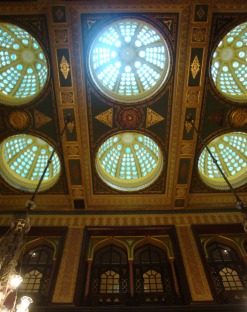 Interior of Pera Palace HotelDesigned by the Levantine architect Alexandre Vallaury, the Pera Palace was purpose-built in 1895 to accommodate guests arriving from Europe on the Orient Express train. On arrival they were carried up the hill in sedan chairs, one of which is preserved in the hotel. Room 101 is kept as a memorial to Mustafa Kemal Atatürk who was a regular guest while Room 411 retains the typewriter used by Agatha Christie. Completely renovated and modernised, the hotel reopened in 2011.
Interior of Pera Palace HotelDesigned by the Levantine architect Alexandre Vallaury, the Pera Palace was purpose-built in 1895 to accommodate guests arriving from Europe on the Orient Express train. On arrival they were carried up the hill in sedan chairs, one of which is preserved in the hotel. Room 101 is kept as a memorial to Mustafa Kemal Atatürk who was a regular guest while Room 411 retains the typewriter used by Agatha Christie. Completely renovated and modernised, the hotel reopened in 2011.
Just past the hotel stands the beautiful Palazzo Corpi designed in 1873 by the Italian architect Giacomo Leoni for a family of Genoese bankers. It was built and decorated using materials mainly imported from Italy. Today when it serves as a Soho House hotel it’s hard to believe that it could ever have been wasted as a consulate but in fact it had been used by the American government since 1882 and had been owned by it since 1907 when the ambassador, who had paid for it out of his own pocket, recouped his money by winning a game of poker.
Eating
Çok Çok Thai Turkish food may be great but there comes a time when what you really, really want is a taste of the Orient. Çok Çok dishes up some of the most authentically Thai cuisine in İstanbul courtesy of a Thai chef in a stylish restaurant easily identifiable by the large wooden Buddha by the door. There’s a deck outside for summer dining. Meşrutiyet Caddesi No. 51/A, Tel: 0212-292 6496
The spacious Pera Cafe on the ground floor of the Pera Museum will remind some visitors of Vienna. Just don’t head there for a coffee on a Monday. While drinking your coffee take a look at the piano which used to belong to Greek opera singer, Maria Callas. Callas gave it to her singing teacher, Elvira de Hidalgo, when she left for the USA in 1945. When De Hidalgo started teaching at the Ankara Conservatory the piano was shipped from Greece, taken across the Bosphorus and then trained to the capital. She in turn gave it to her friend Mordo Dinar who took it back to Istanbul to inspire Yiğit Okur’s novel, The Piano. In 2002 Dinar’s daughter gave it to İnan Kıraç who placed it in the cafe for us all to admire.
Sleeping
Ansen Suites Meşrutiyet Caddesi No. 70, Tel: 0212-245 88 08
Büyük Londra Oteli Meşrutiyet Caddesi No. 53, Tel: 0212-245 06 70
Palazzo Donizetti Grand 79-room hotel just across the road from the Pera Palace where bedrooms mix aspects of the oriental with the most modern Western designs to pleasing effect. The top-floor Pera Sahne restaurant has a better view than the Pera Palace – although it’s not a patch on Sultanahmet. Asmalı Mescit Sokak No. 55, Tel: 0212-249 51 51
Pera Palace Hotel Hotels don’t get much more historic than the Pera Palace although all its rooms have been modernised to meet the needs of modern visitors. The spa is in the basement but there is plenty of other public space, including the magnificent lounge where afternoon teas are a big deal. The bar, too, is inviting – although strangely you can’t get anything to eat or even a coffee there after midnight. Meşrutiyet Caddesi Nos. 52, Tel: 0212-377 40 00
Pera Rose Meşrutiyet Caddesi No. 87, Tel: 0212-243 15 00
Pera Tulip Hotel Meşrutiyet Caddesi No.103, Tel: 0212-243 85 00
Transport info
If you want to use public transport to get to Tepebaşi the funicular from Karaköy to Tünel offers the easiest access although there is also a handy Metro stop at Şişhane.
Coming from Taksim Square you can take the nostalgic tram and get out at Galatasaray. Or you can walk along İstiklal Caddesi.
Nearby areas
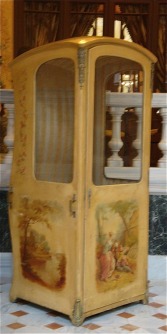 Guests used to be carried from Sirkeci Station to the Pera Palace Hotel in sedan chairs like this one
Guests used to be carried from Sirkeci Station to the Pera Palace Hotel in sedan chairs like this one

